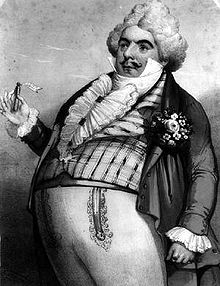Don Pasquale
| Don Pasquale | |
|---|---|
| Opera by Gaetano Donizetti | |

Luigi Lablache as Don Pasquale in the 1843 premiere
|
|
| Description | opera buffa |
| Librettist |
|
| Language | Italian |
| Premiere | 3 January 1843 Théâtre-Italien, Paris |
Don Pasquale (Italian pronunciation: [dɔm paˈskwaːle; dom]) is an opera buffa, or comic opera, in three acts by Gaetano Donizetti with an Italian libretto completed largely by Giovanni Ruffini as well as the composer. It was based on a libretto by Angelo Anelli for Stefano Pavesi's opera Ser Marcantonio written in 1810 but, on the published libretto, the author appears as "M.A."
Donizetti so dominated the preparation of the libretto that Ruffini refused to allow his name to be put on the score. This resulted in confusion over the identity of the librettist for more than half a century, but as Herbert Weinstock establishes, it was largely Ruffini's work and, in withholding his name from it as librettist, "Donizetti or Accursi may have thought that, lacking Ruffini's name, the authorship might as well be assigned to Accursi's initials as to a pseudonym".
The opera was first performed on 3 January 1843 by the Théâtre-Italien at the Salle Ventadour in Paris with great success and it is generally regarded as being the high point of the 19th century opera buffa tradition and, in fact, marking its ending.
Donizetti had just returned to Paris from Vienna in the autumn of 1842 and it was there that it was suggested to him by Jules Janin, the newly appointed director of the Théâtre-Italien, that he might compose a new opera for that house. Janin prepared a formal proposal on 27 September, but while no specific subject nor title was mentioned, Janin suggested that it should be a new opera buffa tailored to the talents of some major singers including Giulia Grisi, Antonio Tamburini, and Luigi Lablache.
At around the same time in September, the Italian émigré librettist Giovanni Ruffini, who lived in Paris, was approached by Michele Accursi (who is described as "Donizetti's Paris factotum, [an] Italian exile, and politically treacherous double agent" ) with the suggestion that Ruffini offer his services to Donizetti as a librettist. This is confirmed by a letter from Ruffini to his mother of around 5 October in which the librettist tells her of Accursi's suggestion that the composer would use a story which was written in 1810 and that he would need "a working stonemason of verses to remake the old libretto, to cut, change, add, plaster, and I don't know what." In addition, it is clear from another letter on 11 October to his mother that Ruffini is hard at work: "I've been eating up the paper, as they say. It's not a question of doing it well or doing it badly, but of doing it fast." By the end, Ruffini stated that so much of the refinement of the work had been done by Donizetti that he felt that "my freedom of action having been paralyzed by the maestro, I don't, so to say, recognize it as mine". Therefore, he refused to have his name associated with the libretto, which was eventually published by Casa Ricordi as by "M.A.", since it was Accursi who officially ceded the rights to Ricordi so long as his name was never associated with the work.
...
Wikipedia
